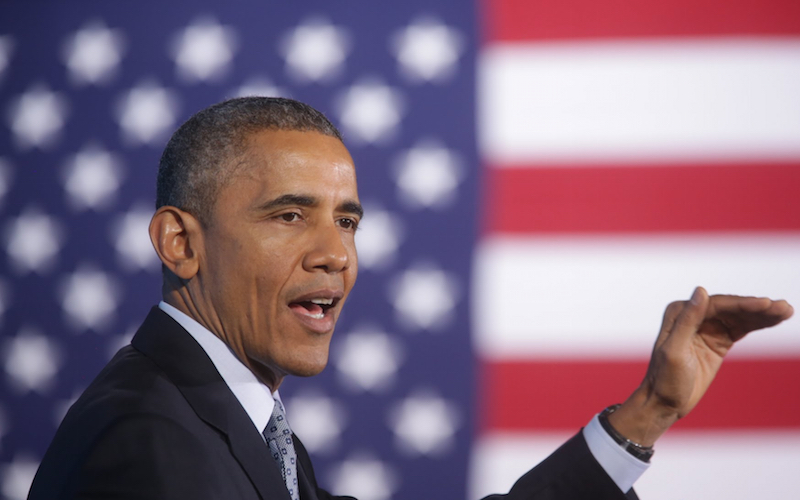
Mao and Washington’s Iran Policy
The bilateral relationship between the United States and Iran is making a subtle shift. Iran may no longer be seen as a terror threat to the United States much in the same way it has been for the past few decades. An unclassified report submitted to the U.S. Senate by James Clapper, the Director of National Intelligence, reveals this shift towards Iran. However, Iran is still considered a regional threat. Submitted to Congress last month, the report also removed Hezbollah, an Iran-backed Lebanon-based militant group from the list. In previous years, both Iran and Hezbollah were classified as direct threats to the “interests of U.S. allies.” This is a significant diplomatic achievement for Tehran.
This shift baffles many people including Arkansas Senator Tom Cotton and Israeli Prime Minister Netanyahu. They have spared no effort to thwart a potential U.S.-Iranian agreement. Breaking long standing diplomatic protocols, Mr. Netanyahu addressed the U.S. Senate with the desire to enlighten the American public about “a potential deal with Iran that could threaten the survival of Israel.” Additionally, Sen. Cotton convinced his colleagues to sign a letter to the Iranian leaderships reminding them of the precariousness of the nuclear deal with the Obama administration. Both episodes produced controversy.
Much to the chagrin of the GOP and Netanyahu, the Obama administration’s Iran policy seems to remain unchanged. The terror assessment report, which was prepared long before the kerfuffle over the Netanyahu speech and the Cotton letter took place, happens to be only one of the many indications of Washington’s consistent policy on Iran.
In an interview with the Huffington Post last week, a candid President Obama said the nuclear deal with Iran is, indeed, a matter of prestige to him. It is, therefore, not hard to understand why Obama remains resolute in reaching an outcome with Iran.
But the Iranian nuclear puzzle is not a binary one that a simple ‘give-and-take’ approach would be sufficient to solve. The Obama administration needs to deal with several factors before it can hammer out a deal with the Iranians: Israel’s paranoia, Saudi Arabia’s skepticism, Iraq, Syria, and Yemen’s ongoing civil war. Thus far, the Obama administration continues to manifest a level of confidence that the negotiation process holds promise. So, where does this confidence come from? It is a Maoist foreign policy pursued by Washington.
Mao Zedong formed alliances with his political foes that he considered secondary threats in order to negotiate the formidable ones. In the 1940s, Mao’s unlikely coalition mounted a strong resistance against the Japanese occupation of China. Over the following decades, he perfected the art of what Mao called “principal contradiction” by rallying behind the Soviets, abandoning them, and later wooing the Americans to counter the Soviet threat. Alignment and re-alignment is not rare in the history of international relations. Mao Zedong blended opportunism with one the quintessential features of international politics in a fashion that became the cornerstone of China’s foreign policy.
Washington’s present engagement policy with Iran resembles Mao’s foreign policy. The Obama administration has long been involved in an intense negotiation process with Iran. Iran yearns to establish the Islamic Republic as a major regional power. A nuclear arsenal is guaranteed to give Iran that prestigious status. Iran going nuclear is a surefire recipe to bring the ever-deteriorating Middle East to the verge of collapse. No geopolitical actor wants it or to see it happen. Iran is adamant and delusional yet it’s a rational actor. Otherwise, Iran would not have come to the negotiation table. Unlike North Korea, Iran has a sizeable educated middle-class who prefer good foods to nukes. Their aspiration for a better life is not unknown to Iranian leaderships and the rest of the world. Hence, a cautious Washington is betting on diplomacy.
But the Mullahs in Tehran cannot trust America. History illustrates this. Without trust between the two parties, there will be no deal. Washington, being a responsible actor, has stepped up to create a minimum level playing field. This is why Iranian involvement in the fight against the Sunni fanatics- known by the fancy acronyms IS, ISIS, or ISIL- was welcomed. It’s a workable trade-off for Washington that sees a thin line of hope in passing the buck to Iran since the Obama administration is reluctant to deploy ground troops in Iraq. Two things are achieved by this. One is Iran’s commitment in aiding the United States in an unpredictable war that saw nearby Arab nations moonlight as striking partners. The other is that Iran can take pride in helping contain the wild fire ravaging its neighborhood.
Iran is enthusiastic to be a part of the force that battles ISIS. It gives Tehran the long-awaited opportunity to portray its image as a responsible actor in regional affairs. The threat assessment report also praised Iran’s intentions to “dampen sectarianism, build responsive partners, and deescalate tensions with Saudi Arabia.” Clearly, this is an overstatement. Iran cannot earn the trust of the Saudis when they are backing the Houthis to take control of Yemen along with a host of Iranian actions that run counter to Saudi interests.
But can Washington discount Hezbollah’s terrorist capabilities just to please Iran? Max Abrahms, a professor of terrorism at Northeastern University, sums it up well, “Hezbollah is relatively centralized under the direction of Hassan Nasrallah, who keeps his operatives in check. Only certain targets are acceptable and those exclude anything outside the Middle East, at least these days. By contrast, ISIS is a more diffuse group that is more risk-acceptant. For these reasons, ISIS is less preventable and is thus seen as a greater U.S. threat.” Regardless, Hezbollah’s removal from the terror threat reflects Washington’s seriousness in forging a workable relationship with Iran.
This trust building process not only complements the Obama administration’s effort to seal the nuclear deal, but also provides leverage to ramp up the pressure on Israel to resurrect the two-state negotiations, or at least to act rationally. Bibi Netanyahu’s flip-flopping over the question of an independent Palestinian state irked the Obama administration, and with good reason. Worse, the unease between the two leader’s relationship and a growing European pressure against Israel on the question of Palestinian statehood are making the situation murkier. Furthermore, Netanyahu is continuously trying to undermine Mr. Obama’s effort to deal with the Iranians. Israel is appearing an unhelpful ally to the United States, whereas Iran is increasingly important in deciding how the future Middle East will look. This is exactly where Obama’s policy looks like that of Mao’s. The president has made it clear that his administration will carry on the discussion in spite of the old friend’s nagging: “I don’t think it [Netanyahu’s reelection] will have a significant impact.”
Washington’s attempt to cozy up to Iran is not due to the spring breeze of Nowruz. Iran is their last bet both in lowering the temperature of the debate over Iran’s nuclear aspirations and in reining in ISIS. But is Iran trustworthy? Abrahms thinks “not” since Iranian Mullahs are “still committed to the Revolution or at least promoting Iranian national power, particularly in the Middle East from Lebanon to Yemen.” How will Washington cope with Iran then? Mao has the answer.
